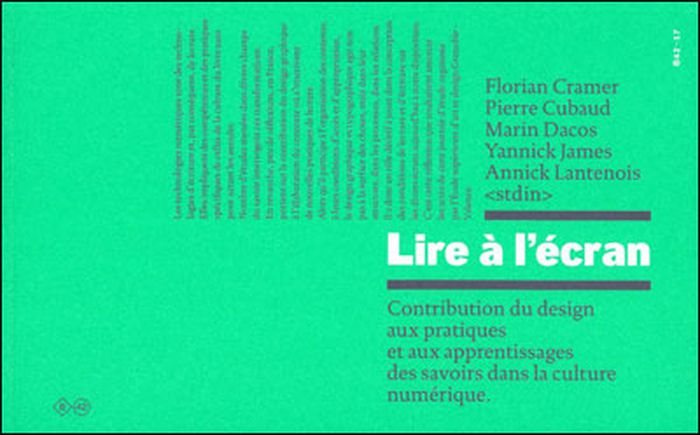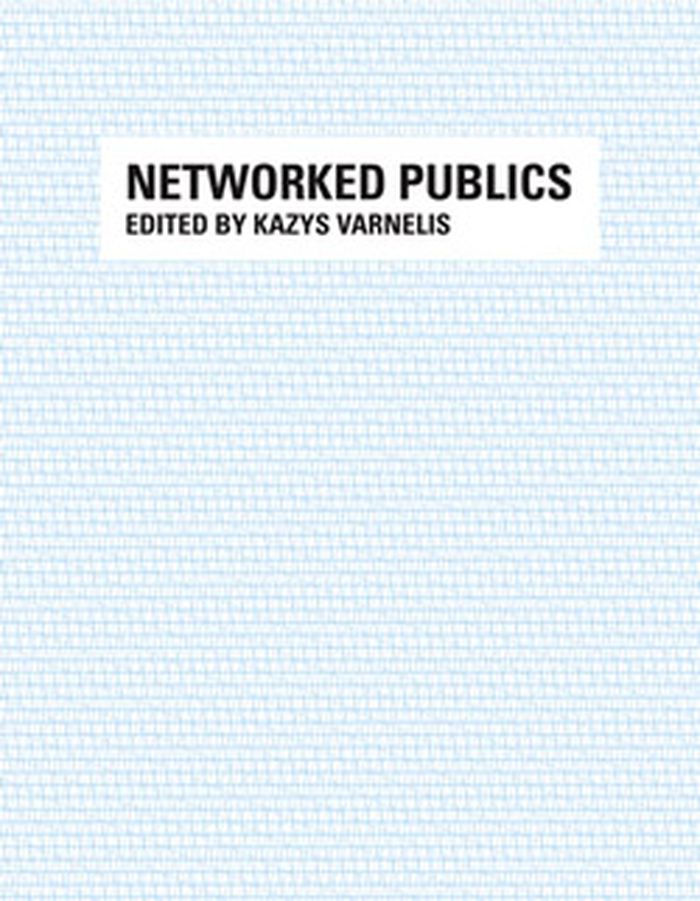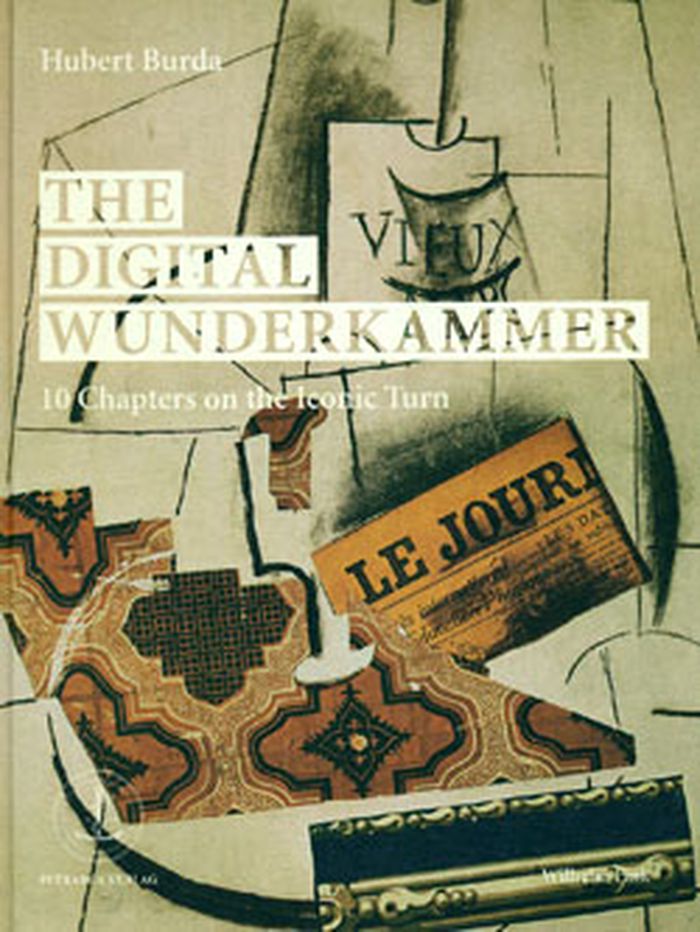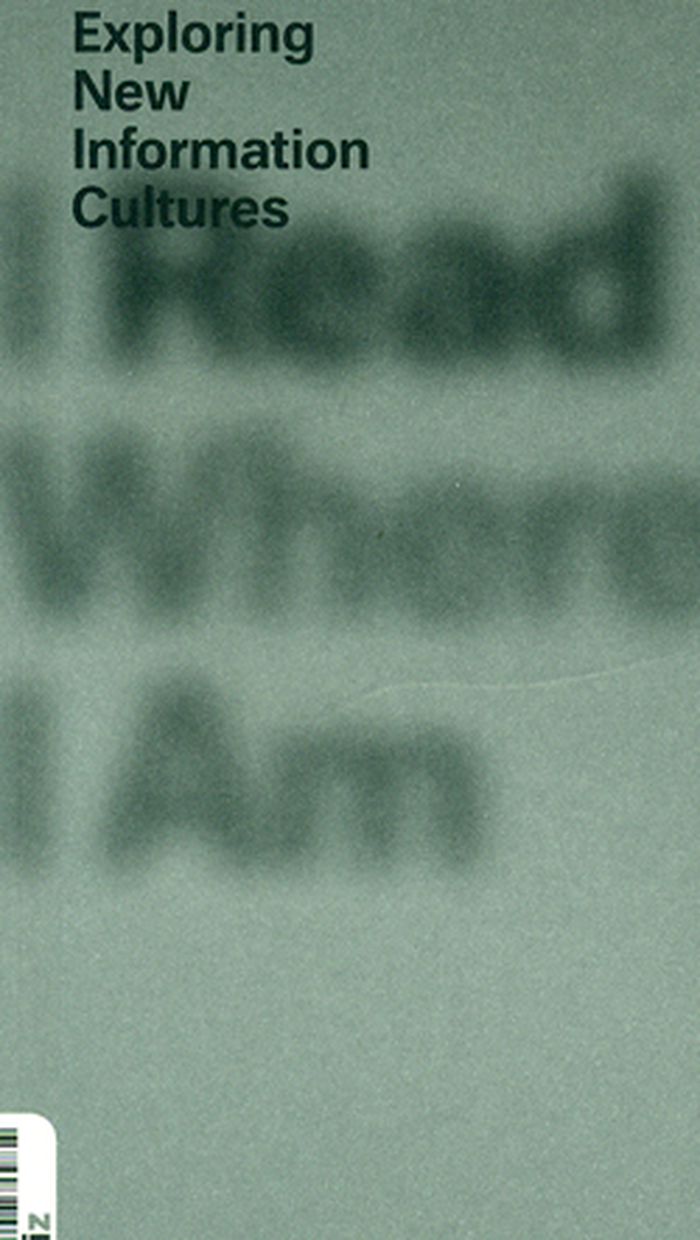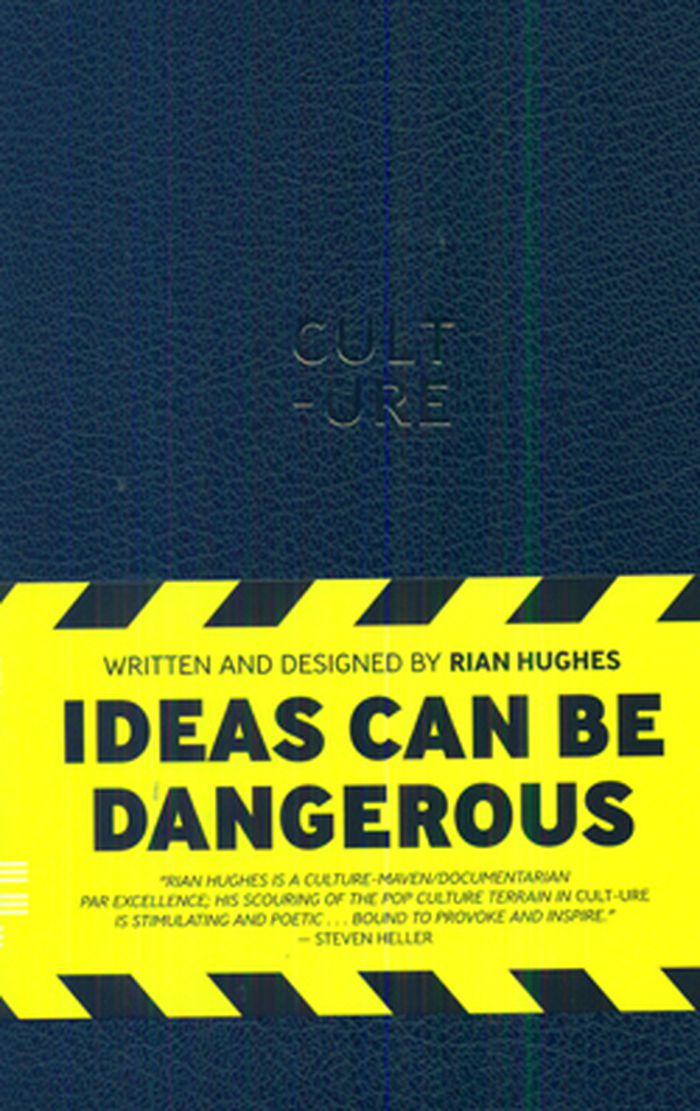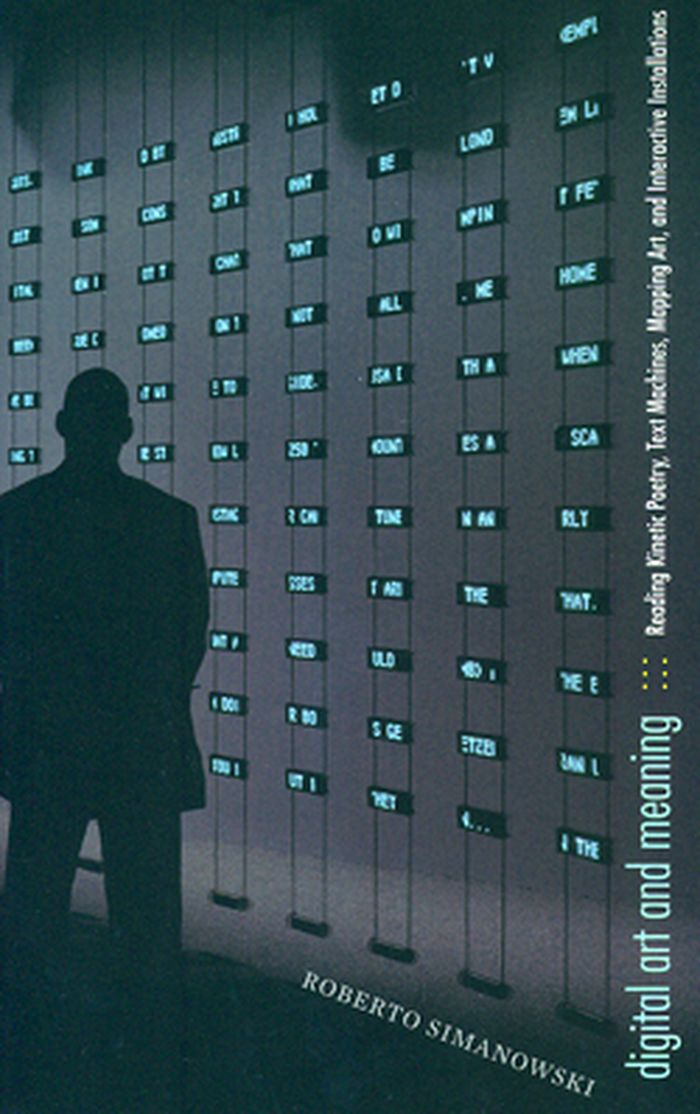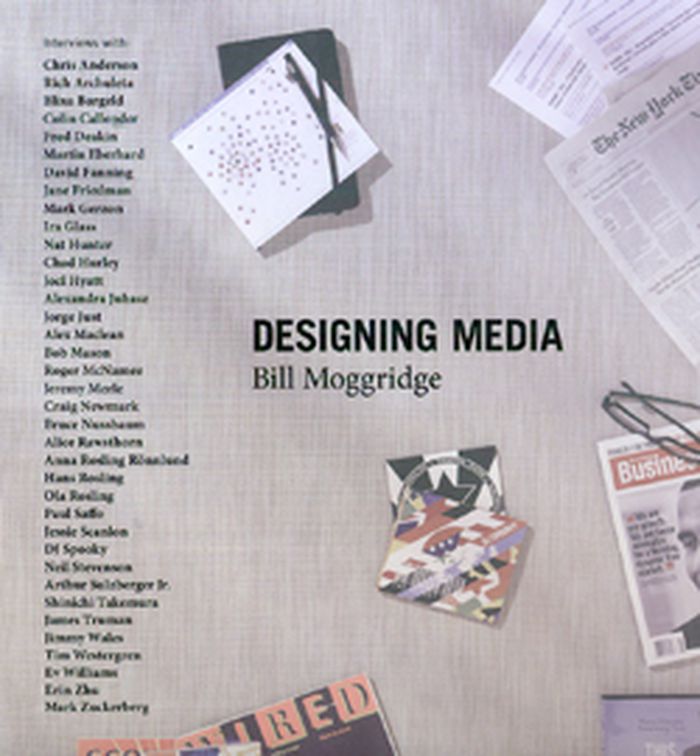$24.95
(available to order)
Summary:
Les technologies numériques sont des technologies d'écriture et, par conséquent, de lectures. Elles impliquent des compétences et des pratiques spécifiques de celles de la culture du livre sans pour autant les annuler. Alors qu'il participe à l'organisation des contenus, à leurs condition d'accès et d'appropriation, le design graphique et typographique agit non pas à la(...)
Lire à l'écran : contribution du design aux pratiques et aux apprentissages des savoirs dans la culture numérique
Actions:
Price:
$24.95
(available to order)
Summary:
Les technologies numériques sont des technologies d'écriture et, par conséquent, de lectures. Elles impliquent des compétences et des pratiques spécifiques de celles de la culture du livre sans pour autant les annuler. Alors qu'il participe à l'organisation des contenus, à leurs condition d'accès et d'appropriation, le design graphique et typographique agit non pas à la surface des choses, mais dans leur structure, dans le processus, dans les relations. Il y a donc un rôle décisif à jouer dans la conception des conditions de lecture et d'écriture sur les divers écrans aujourd'hui à notre disposition. C'est cette réflexion que souhaitent amorcer les actes de cette journée d'étude organisée par l'École supérieure d'art et design Grenoble-Valence.
Epistemology
$70.95
(available to order)
Summary:
This cutting-edge text offers an introduction to the emerging field of media archaeology and analyses the innovative theoretical and artistic methodology used to excavate current media through its past. Written with a steampunk attitude, What is Media Archaeology? examines the theoretical challenges of studying digital culture and memory and opens up the sedimented(...)
Jussi Parikka : What is media archaeology?
Actions:
Price:
$70.95
(available to order)
Summary:
This cutting-edge text offers an introduction to the emerging field of media archaeology and analyses the innovative theoretical and artistic methodology used to excavate current media through its past. Written with a steampunk attitude, What is Media Archaeology? examines the theoretical challenges of studying digital culture and memory and opens up the sedimented layers of contemporary media culture. The author contextualizes media archaeology in relation to other key media studies debates including software studies, German media theory, imaginary media research, new materialism and digital humanities.
Epistemology
Networked publics
$22.95
(available to order)
Summary:
Digital media and network technologies are now part of everyday life. The Internet has become the backbone of communication, commerce, and media; the ubiquitous mobile phone connects us with others as it removes us from any stable sense of location. Networked Publics examines the ways that the social and cultural shifts created by these technologies have transformed our(...)
Networked publics
Actions:
Price:
$22.95
(available to order)
Summary:
Digital media and network technologies are now part of everyday life. The Internet has become the backbone of communication, commerce, and media; the ubiquitous mobile phone connects us with others as it removes us from any stable sense of location. Networked Publics examines the ways that the social and cultural shifts created by these technologies have transformed our relationships to (and definitions of) place, culture, politics, and infrastructure.
Epistemology
$45.00
(available to order)
Summary:
As digital technology advances at breakneck speed, images are circulating quicker than ever before. But what is the status of the image in the digital era? In this publication, art historian Hubert Burda (born 1940) examines the "iconic turn" in ten themed chapters and conversations with leading cultural theorists. In the first chapter, "The View Through the Window,"(...)
The digital wunderkammer : 10 chapters on the iconic turn
Actions:
Price:
$45.00
(available to order)
Summary:
As digital technology advances at breakneck speed, images are circulating quicker than ever before. But what is the status of the image in the digital era? In this publication, art historian Hubert Burda (born 1940) examines the "iconic turn" in ten themed chapters and conversations with leading cultural theorists. In the first chapter, "The View Through the Window," Burda traces the connection between perspectival painting and the television, demonstrating in the second chapter how the image requires a frame, which in turn requires a material vehicle - the topic of the third chapter - that in our era has become a non-material vehicle with its own formal parameters. In the fourth chapter, "The Mobile Image," Burda shows how images have always been linked to portability, but now migrate to an unprecedented degree, so that anyone with a personal device can globally disseminate, say, footage from a concert via Youtube. A discussion of the capacity of individual images to placate or ennervate leads to a seventh chapter on the appetite for the Sublime and the rhetoric and representation of power throughout art history. Following a discussion of the democratization of celebrity culture, Burda proposes that the Google search box is perhaps the most interesting "interface" of our times, analogous to the seventeenth-century cabinet of curiosities (or wunderkammer). Conversations with Friedrich Kittler, Peter Sloterdijk, Bazon Brock, Horst Bredekamp and Hans Belting further extend this imaginative debate on the "iconic turn."
Epistemology
$24.95
(available to order)
Summary:
When Guy Debord identified the image consumerism of “the society of the spectacle” in the 1960s, he could not have forecast that language would threaten to eclipse the image in the medium of personal technology, creating a world of ubiquitous legibility. Today, we read anytime and anywhere, on screens of all sizes; we read not only newspaper articles, but also databases,(...)
I read where I am : exploring new information cultures
Actions:
Price:
$24.95
(available to order)
Summary:
When Guy Debord identified the image consumerism of “the society of the spectacle” in the 1960s, he could not have forecast that language would threaten to eclipse the image in the medium of personal technology, creating a world of ubiquitous legibility. Today, we read anytime and anywhere, on screens of all sizes; we read not only newspaper articles, but also databases, online archives, search engine results and navigational structures. We read while out on the street, at home or in the office, with a complete library to hand - but less and less we read a book at home on the couch. In other words, we are, or are becoming, a different kind of reader. I Read Where I Am contains texts about the future of reading and the status of the word in the digital age from designers, philosophers, journalists and politicians, looking at both sides of the argument for printed and digital reading matter.
Epistemology
$54.00
(available to order)
Summary:
Cult-ure is the culmination of a decade's research into why and how we communicate. Revealing how ideas are transmitted through words, symbols and gestures, how such ideas gain cultural currency via the theory of the meme, this book provides a provocative exploration into media convergence within our digital age and an insider's guide into the changing nature of(...)
Cult-ure: Ideas can be dangerous
Actions:
Price:
$54.00
(available to order)
Summary:
Cult-ure is the culmination of a decade's research into why and how we communicate. Revealing how ideas are transmitted through words, symbols and gestures, how such ideas gain cultural currency via the theory of the meme, this book provides a provocative exploration into media convergence within our digital age and an insider's guide into the changing nature of communications, perceptions and identities.
$28.00
(available to order)
Summary:
In a world increasingly dominated by the digital, the critical response to digital art generally ranges from hype to counterhype. Popular writing about specific artworks seldom goes beyond promoting a given piece and explaining how it operates, while scholars and critics remain unsure about how to interpret and evaluate them. This is where Roberto Simanowski intervenes,(...)
Digital art and meaning: reading kinetic poetry, text machines, mapping art, and interactive installations
Actions:
Price:
$28.00
(available to order)
Summary:
In a world increasingly dominated by the digital, the critical response to digital art generally ranges from hype to counterhype. Popular writing about specific artworks seldom goes beyond promoting a given piece and explaining how it operates, while scholars and critics remain unsure about how to interpret and evaluate them. This is where Roberto Simanowski intervenes, demonstrating how such critical work can be done. Digital Art and Meaning offers close readings of varied examples from genres of digital art such as kinetic concrete poetry, computer-generated text, interactive installation, mapping art, and information sculpture. For instance, Simanowski deciphers the complex meaning of words that not only form an image on a screen but also react to the viewer’s behavior; images that are progressively destroyed by the human gaze; text machines generating nonsense sentences out of a Kafka story; and a light show above Mexico City’s historic square, created by Internet users all over the world. Simanowski combines these illuminating explanations with a theoretical discussion that employs art philosophy and history to achieve a deeper understanding of each particular example of digital art and, ultimately, of the genre as a whole.
books
Networked publics
$42.00
(available to order)
Summary:
Digital media and network technologies are now part of everyday life. The Internet has become the backbone of communication, commerce, and media; the ubiquitous mobile phone connects us with others as it removes us from any stable sense of location. This publication examines the ways that the social and cultural shifts created by these technologies have transformed our(...)
Networked publics
Actions:
Price:
$42.00
(available to order)
Summary:
Digital media and network technologies are now part of everyday life. The Internet has become the backbone of communication, commerce, and media; the ubiquitous mobile phone connects us with others as it removes us from any stable sense of location. This publication examines the ways that the social and cultural shifts created by these technologies have transformed our relationships to (and definitions of) place, culture, politics, and infrastructure.
books
December 2008
Epistemology
Designing media
$45.95
(available to order)
Summary:
In Designing Media, design guru Bill Moggridge examines connections and conflicts between old and new media, describing how the MSM have changed and how new patterns of media consumption are emerging. The book features interviews with thirty-seven significant figures in both traditional and new forms of mass communication; interviewees range from the publisher of the New(...)
Designing media
Actions:
Price:
$45.95
(available to order)
Summary:
In Designing Media, design guru Bill Moggridge examines connections and conflicts between old and new media, describing how the MSM have changed and how new patterns of media consumption are emerging. The book features interviews with thirty-seven significant figures in both traditional and new forms of mass communication; interviewees range from the publisher of the New York Times to the founder of Twitter.
Epistemology
David Joselit : After art
$34.95
(available to order)
Summary:
Examining the work of architectural firms such as OMA, Reiser + Umemoto, and Foreign Office, as well as the art of Matthew Barney, Ai Weiwei, Sherrie Levine, and many others, After Art provides a compelling and original theory of art and architecture in the age of global networks.
David Joselit : After art
Actions:
Price:
$34.95
(available to order)
Summary:
Examining the work of architectural firms such as OMA, Reiser + Umemoto, and Foreign Office, as well as the art of Matthew Barney, Ai Weiwei, Sherrie Levine, and many others, After Art provides a compelling and original theory of art and architecture in the age of global networks.
